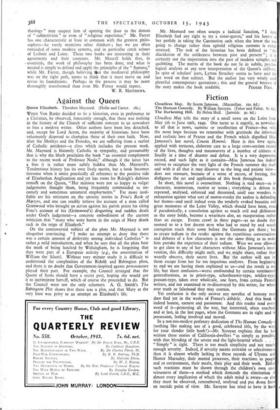Against the Queen
Queen Elizabeth. Theodore Maynard. (Hollis and Carter. t8s.)
WHEN Von Ranke decided to 6e a historian, even in preference to a Christian, he observed, innocently enough, that there was nothing in the history of the Church of sufficient concern to us nowadays to bias a modern writer. Other authors have been less detached, and, except for Lord Acton, the majority of historians have been vehemently disposed to champion those of their own faith. Now, after the Motleys and the Froudes, we are suffering from a surfeit of Catholic antidotes—a class which includes the present work. Mr. Maynard is blatantly Catholic in sympathy, and presumably that is why the blurb proclaims the book " an essential complement to the recent work of Professor Neale," although if the latter has a bias it is rather more subtly hidden than Mr. Maynard's. Tendentious history has its own lively merits, but a book becomes tiresome when it omits practically all reference to the positive side of Elizabethan Anglicanism and yet has room for Raleigh's dubious remafk on the Queen, " Her minions were not so happy as vulgar judgements thought them, being frequently commanded to un- comely and sometimes unnatural employments." Far more justi- fiable are his strictures on the atrocity stories in Foxe's Book of Martyrs, and one can readily believe the account of a man called Grimwood who brought an action against his parish priest for citing Foxe's account of his (Grimwood's) disgusting and sudden death under God's judgement—a concrete embodiment of the current witticism that "many who were burnt in the reign of Mary drank sack in the reign of Elizabeth."
On the controversial subject of the plots Mr. Maynard is not altogether convincing. " I make no attempt to deny that there was a certain amount of disloyalty among individual Catholics " is rather „a mild introduction, and when he says that all the plots bear the mark of being hatched by Walsingham, he is forgetting that they were part of a European activity (e.g., the assassination of William the Silent). Without very minute study it is difficult to understand the complexities of the Ridolfi and Babington plots, and there is no doubt that Government-inspired agents provocateurs played their part. For example, the Council arranged that the Queen of Scots should have a secret post, hoping she would use it to incriminate herself, which of course she proceeded to do. But the Council were not the only schemers. A. G. Smith's The Babington Plot shows that there was a plot, and that Mary at the very least was privy to an attempt on Elizabeth's. life.
Mr. Maynard too often usurps a judicial function, " I deny Elizabeth had any right to try a sister-queen," and his horror at her perfidy in taking the Coronation oath when she knew she was going to change rather than uphold religious customs is rather strained. The task of the historian has been defined as "the elucidation of the unlikeness between past and. present " ; it is certainly not the importation into the past of modern scruples and quibbling. The merits of the book do not lie in subtle, psycho- logical analysis or any new interpretation of the Queen's celibacy. In spite of scholars' jeers, Lytton Strachey seems to have said the last word on that subject. But the author has very wisely used plentiful contemporary quotations ; this and the general Interest of the story makes the book readable. PHOEBE POOL.


























 Previous page
Previous page